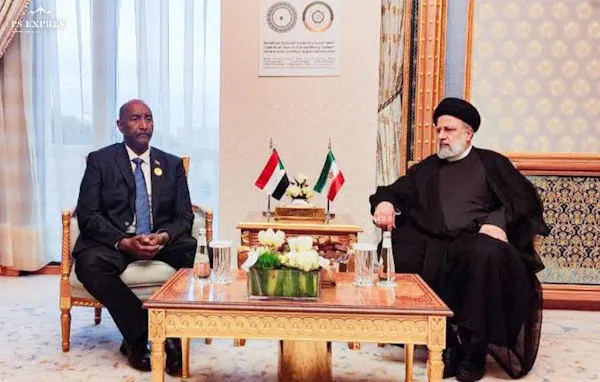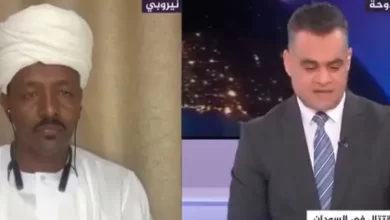An American diplomat warns of Iran’s
control over Sudan and the Red Sea

Peter Hoekstra, the US ambassador to the Netherlands during the Trump administration, and former chairman of the House Intelligence Committee, wrote an article this week on the right-wing “Gatestone” Institute website warning of the dangers of what he described as Iran’s control over Sudan and the Red Sea, in the following article:
While the Biden administration is preoccupied with its re-election next November, in addition to extinguishing a series of fires it helped ignite in Ukraine, the Middle East, and the Indo-Pacific region, a new threat of urgent concern lurks on the horizon: Iran’s increasing expectation into Sudan.
Sudan is in Iran’s pocket
Bringing Sudan into Iran’s enclave would provide the latter with more oil, gold, and rare minerals, as well as another port on the Red Sea from which it could continue to disrupt maritime trade.
Sudan will also provide Iran with proximity to Israel, and an additional launching pad to pummel Israel with more deadly drone attacks – at least until the nuclear weapons program is completed.
Iran could also add Sudan to the list of four other countries it already controls in the region: Iraq, Syria, Lebanon, and Yemen.
Sudan, with the support of Iran, would then be on its way to becoming another Hamas, Al-Qaeda, or Taliban, expanding onto the rest of the African continent.
What makes for a much bleaker future in this case is Sudan’s history of hosting extremists and jihadists from the far right to the far left, during the rule of the previous regime.
Sudan has previously hosted Osama bin Laden, the leader of Al Qaeda, Hamas and Hezbollah as well as Carlos the Jackal.
That warm welcome for violent extremists earned Sudan a place on the list of State Sponsors of Terrorism.
Bloomberg reported on January 24th that Iran is supplying the Sudanese Armed Forces led by 1st Lt. Gen. Abdel Fattah al-Burhan with military drones – the new “instant and cheap Air Force,” which is far more accessible than a real Air Force. Iran also trained the Sudanese on how to manufacture drones locally.
The Sudanese Security Forces, rumored to be linked to the “Muslim Brotherhood Organization” as well as other Islamists, are currently taking part in a civil war.
The alliance of dictatorial regimes
The Sudanese regime headed by Al-Burhan is a dictatorial regime. Reports indicate that he committed terrible crimes against the Sudanese people, including -but not limited to- bombing entire neighborhoods and killing civilians.
Furthermore, this regime signed a strategic agreement with Iran, an enemy of democracy that kills and wounds American Forces in an attempt to pressure the United States out of the region.
It is imperative that the United States doesn’t give in to such pressures, as it did in Afghanistan. No matter how modest the American Forces that currently exist in the Middle East are, it sends a strong message that; the entire region doesn’t belong to the most aggressive of predators.
Both the Iranian and Sudanese regimes, under the security cooperation agreement signed last month, have become an additional threat to Israel, the region, and the national security of the United States and its allies.
Sudanese security forces, with Iran’s help, are trying to defeat the Rapid Support Forces, and the Iranians clearly see a new market for arms sales and new economic agreements as initial steps to take advantage of the chaos in the world to advance their geostrategic goals.
Iranian naval base
Iran has reportedly offered Sudan a “warship carrying helicopters” in exchange for allowing Tehran to build a naval base in the country. The request was reportedly rejected for fear of Israel and the United States’ reactions.
After the Biden administration eased sanctions on Iran, Iran was able to revitalize its treasury, and boost its cash reserves by billions of dollars through increased oil sales.
These additional funds were subsequently used to help finance the “Houthi” threat to shipping in the Red Sea and Gulf of Aden, to finance Hamas’ brutal attack on Israel on the 7th of October, to funding its massive drone and missile attacks on Israel on the 14th of April, in addition to financing Hezbollah’s acquisition of more weapons.
Iran is now seeking to use its finances to purchase influence over the Sudanese government, which is locked in a violent and bloody civil war. Sudan and Iran have a complex history, but the civil war in Sudan has created an outlet for Iran to build stronger and closer relations with Sudanese leaders. These efforts could lead to Sudan in itself, or groups within it, becoming Iran’s latest proxy in its valiant efforts to spread conflicts and distract the West.
The strategic location of Sudan
Given Sudan’s strategic location, Iranian efforts to bring Sudan under its influence must be thwarted. In a world that seems to be at stake, it is imperative that the United States and our allies in Europe prevent the spread of chaos that is exploding in Eastern Europe and the Middle East.
The Russia-Ukraine war has strained Western military supply capabilities and exposed deficiencies in both the West’s funding and defense industrial base. In addition to causing an ever-expanding division in Washington, D.C., as was evident in the Congress’s months-long delay in approving the latest arms package for Ukraine. The arms package included funding for a key American ally, Israel, in its ongoing war against Hamas in Gaza and the threat posed by Hezbollah in Lebanon.
Another issue of great interest in the region is the ongoing threat to international shipping posed by the Houthi in Yemen.
There is but one constant in all these troubled regions – Iran. Iran’s support for its proxy armed groups, as well as its provision of weapons to Russia.
Reducing the malevolent Iranian influence is essential to ending the ongoing conflicts in the Middle East, but it is also necessary for the West to wake up and stop the expansion of Iranian influence into other regions of the world.
Utilizing the chaos
The Iranians clearly see arms sales and new economic agreements as initial steps to take advantage of the chaos in the world to advance their geostrategic goals of “exporting the revolution,” dominating the region, and displacing other oil-rich countries and holy sites in the Gulf.
These are dangerous and escalatory steps that Iran is taking to increase its influence and ability to seed chaos and terrorism in the region. The US government has publicly called for a halt to arms sales to Sudan, adding that Sudan faces a “crisis of epic proportions.”
Ambassador Linda Thomas-Greenfield, the Representative of the United States of America to the United Nations, indicated that the city of El-Fasher “is on the verge of a large-scale massacre.”
These official US statements highlight the acutely desperate situation in Sudan today, a situation exacerbated by Iran and for its benefit.
Conclusion
The bottom line for America and Europe is that the strategy of engagement and appeasement with Iran has failed miserably. Not only is Iran a major supplier to the Russian war effort in Ukraine, it has also successfully destabilized the Middle East.
The war currently being waged by Iran’s proxies has led to massive public demonstrations. These demonstrations appear to be well-organized and well-financed in the United States and Europe by outside agitators dedicated to the overthrow of America, the rule of law, and the West – favoring terrorism and tyranny.
Therefore, it is imperative to redouble efforts made to hinder Iran’s expansion of its chaos and malevolent influence without delay. Tensions in the Middle East and the ever-mounting pressure to appease terrorists have also negatively affected relations between the United States and Israel – the two main countries that stand in the way of predatory regimes, such as Iran, Russia, and Communist China, from achieving their goals.
Washington cannot allow this chaos to be an outlet for Iran to further its expansion in the Middle East and Africa. The lessons of the past five decades are clear. When Iran sees an opening –an opportunity in the chaos– it will exploit the situation and leverage its resources to create more areas of chaos in other parts of the world to further enhance its influence.
The United States and Europe must readily confront Iran’s efforts in the Middle East and Sudan. We cannot allow the creation of new terrorist agents for Iran.





